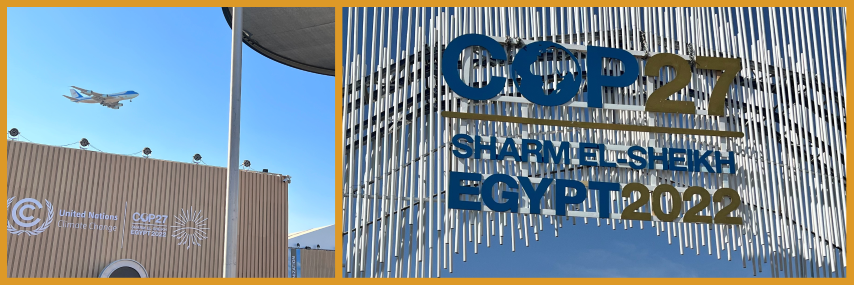
‘Together For Implementation.’ That has been the mantra of the COP27 Presidency, a direct and deliberate riposte to the notion that for all the attention garnered by this annual gathering of world leaders, financial institutions, climate experts, activists, campaigners and – let’s face it – lobbyists, it is little more than an expensive talking shop.
On a practical level, Sharm El-Sheikh was an imperfect host. Hotels hiked their rates to thousands of dollars a night. The conference Wi-Fi fell over at the first sign of a Zoom call, putting the kybosh on down-the-line interviews. The centre itself was a maze of pavilions lacking even basic signage and, as has been widely reported, food and water was in short supply for much of the opening week.
Egypt more than made up for these superficial issues by overseeing a COP focused squarely on delivery. COP26 saw countries rally around the fight to ‘keep 1.5 alive’, a reference to the Paris Agreement. COP27 took this principle forward, with discussions around the mobilisation of climate finance and technological innovation dominating plenary sessions and fringe meetings.
The global media gaze has already shifted, decisively, to Bali and the G20 Summit. But as COP27 enters its final 48 hours, there are important conversations to be driven forward – and initiatives to be implemented – before we meet again in Dubai next November.
Here are four things I learned during my ten days on the Egyptian coast, and which are relevant to businesses wherever they are based.
Climate finance is the name of the game…
One of the clear messages from this COP is a growing interest in identifying the most effective channels for mobilising climate finance, and crucially, directing funding for adaptation to the developing world. While nation states and financial institutions are pouring billions of dollars every year into projects designed to combat climate change, finance nonetheless needs to be scaled up dramatically – and quickly. This investment must be mobilised over the immediate years ahead if we are to head off the most devastating impacts of global warming. Delay is not an option.
…but nobody can agree on loss and damage
Financing for loss and damage has been a prevailing theme at COP27. As I told GB News last Friday, the idea is that “there is a role for richer countries to support countries in south Asia and Africa, who are experiencing the worst effects of climate change” in the form of payments to those most impacted by climate breakdown.
Supporters of the movement, such as the Pakistani climate envoy, Nabeel Munir, argue that “loss and damage is not charity, it’s climate justice.” Western leaders are increasingly in agreement: Emmanuel Macron has issued his backing, John Kerry has softened his stance, and five European countries – Austria, Scotland, Belgium, Denmark, and Germany – have committed to fund the loss and damage finance mechanism that the US wants to avoid. But international agreement seems some way off. As my friend Maddie Cuff wrote for the New Scientist on Tuesday, “discussions… reached a political impasse on 14 November”. Will the world’s biggest emitters be willing and able to put competing interests to one side?
Technology is one of the most powerful tools in our arsenal
Successfully mitigating climate change will depend heavily on human ingenuity. There were encouraging signs at COP27 that innovation is proceeding at pace, with technology for adaptation coming forward particularly quickly. There is strong momentum behind green hydrogen, developments in storage technology, and other underutilised forms of renewable energy generation. Capacity building is likely to be the focus of future COP summits.
Non-attendance is becoming taboo
For most world leaders, COP is now a fixture in the diary. President Biden hotfooted it from the US midterm elections to deliver a keynote address last Friday; Brazil’s re-elected President Lula made a landmark commitment to protecting the Amazon; and Rishi Sunak succumbed to political pressure to attend on behalf of the UK.
While the leaders of China, India, Australia and (unsurprisingly) Russia were conspicuous by their absence, the public increasingly expects its figureheads to attend and engage. With Biden and President Xi agreeing to resurrect climate talks during their Bali bilateral earlier this week, we may even see China represented at the highest level in 2023.